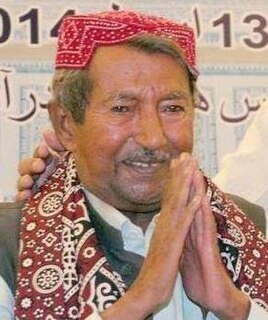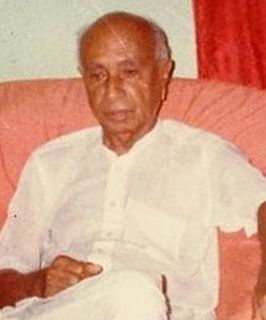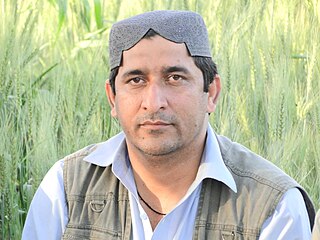Related Research Articles

The Balochistan Liberation Army, also known as the Baloch Liberation Army, is a militant organization based in Afghanistan. The BLA became publicly known during the summer of 2000, after it claimed credit for a series of bombing attacks on Pakistani authorities. The BLA is listed as a terrorist organization by Pakistan, the United Kingdom and the United States.

Sindhudesh is an idea of separate homeland for Sindhis proposed by Sindhi nationalist parties for the creation of a Sindhi state, which would be either autonomous within Pakistan or independent from it. The movement is based in the Sindh region of Pakistan and was conceived by the Sindhi political leader G. M. Syed after the independence of Bangladesh. He gave a new direction to Sindhi nationalism, founded the Jeay Sindh Tehreek in 1972 and presented the idea of Sindhudesh.
Bashir Ahmed Qureshi was a prominent Sindhi nationalist who served as the leader of Jeay Sindh Qaumi Mahaz (JSQM), a Sindhi nationalist movement in Sindh, founded by G. M. Syed. He was assassinated mysteriously with slow poison at the age of 54 years on 7 April 2012.

Jeay Sindh Qaumi Mahaz is a nationalist political party in the Sindh province of Pakistan, that advocates for Sindh's independence from Pakistan. The party was founded in 1995 after death of GM Syed.

Abdul Wahid Arisar was a notable scholar, writer, researcher and Sindhi politician who was one of the heads of the Jeay Sindh Qaumi Mahaz (JSQM), a political party in Sindh. It was reported that there were significant "differences" between Arisar and the head of another faction in the JSQM, Bashir Qureshi. Arisar had previously been chairman of the party in the 1990s.

Mirpur Khas railway station is junction located in middle of the Mirpur Khas, Sindh, Pakistan on Hyderabad - Khokhrapar branch railway line. The station is staffed and has booking office.
Sakrand is a town in the Sindh province of Pakistan. Sakrand is a taluka of the district Shaheed Benazirabad, near about 18 kilometers from the old Nawabshah city. By road it is at three and a half hours drive from Karachi on National Highway and one and a half hour drive from Hyderabad on National Highway. It is rich in Agriculture. It is a Business Town, Exporting Goods To Hyderabad, Sindh and Nawabshah.
There are separatist movements in Pakistan which are based on ethnic and regional nationalism, including independence movements in Balawaristan, Sindh and Balochistan. The government of Pakistan has attempted to subdue these separatist movements.

Ghulam Murtaza Syed, known as G.M Syed was a prominent Sindhi politician, who is known for his scholarly work, passing only constitutional resolution in favor of the establishment of Pakistan from British India's Sindh Assembly in 1943. Later proposing ideological groundwork for separate Sindhi identity and laying the foundations of Sindhudesh movement. He is regarded as one of the founding fathers of modern Sindhi nationalism.
Sindhi nationalism also known as Sindhi Nationalist Movement was launched in the 1972 to separate Sindh from Pakistan. After Bangladesh became independent in 1971, G.M. Syed gave a new direction to nationalism and founded the Jeay Sindh Mahaz in 1972 and presented the idea of Sindhudesh; a separate homeland for Sindhis. G.M. Syed is considered as the founder of modern Sindhi nationalism. However, Sindh nationalists stand divided.

Human rights abuses in Sindh, Pakistan, range from arbitrary arrests and enforced disappearances to torture, extrajudicial killings, and political repression.

The Sindhudesh Liberation Army is a designated terrorist organization based in the Sindh province of Pakistan. It became publicly known in 2010 after it claimed responsibility for a targeted bomb blast on railway tracks near Hyderabad, Pakistan. The group is currently active.

The Jeay Sindh Muttahida Mahaz is one of several major separatist political parties in Sindh, Pakistan, that advocate for the separation of Sindhudesh from Pakistan. Founded in the year 2000, by the veteran Sindhi nationalists belonging to the Sindhudesh movement who left JSQM. The founder and the current Chairman of party Shafi Muhammad Burfat is living in exile in Germany under political asylum.

Muzafar Bhutto was a Sindhi nationalist politician, who served as the Secretary General of the Jeay Sindh Muttahida Mahaz (JSMM). His body was found at a roadside near Hatri bypass, in Hyderabad, Pakistan after he went missing on 25 February 2011. Following his death, JSMM members resorted to heavy aerial firing in different areas of Sindh. The heavy aerial firing created fear and panic among the people in Sindh and forced many business to close down.

Bahauddin Zakaria Express is a passenger train operated daily by Pakistan Railways between Karachi and Multan. The trip takes approximately 16 hours and 5 minutes to cover a published distance of 929 kilometres (577 mi), traveling along a stretch of the Karachi–Peshawar Railway Line. The train named after Abu Muhammad Bahauddin Zakariya, a famous Sufi saint of the Suhrawardiyya order who lived in Multan between 1171-1262.

Sukkur Express is a daily express train service between Karachi and Jacobabad in Pakistan. The train named after Sukkur, a city in Sindh, Pakistan. In beginning it was run between Karachi and Sukkur; later its route was extended to Karachi and Jacobabad.
Larkana Junction railway station is located in middle of the Larkana, Sindh, Pakistan. The station is staffed and has a booking office.
Sukkur railway station is located in Sukkur city, Sukkur district, Sindh province, Pakistan.
Ali Baba, was a renowned short story writer, novelist, poet and playwright of Sindhi including Urdu-language. He received awards for Pride of Performance. He died on 8 August 2016 due to heart attack in his home Karachi.

The Jeay Sindh Students’ Federation Sindhi: abbreviated as JSSF, is the student wing of various separatist organizations struggling for the freedom of Sindhudesh following the ideology of G. M. Syed, founded in 1969. JSSF was a nationalist outfit which emerged from Anti-Unitary System Struggle in the late 1960s and later joined G. M. Syed in his ideology of a separate homeland for Sindhis in 1972. Since then, it has been working as the students’ front of the Jeay Sindh or Sindhudesh movement.
References
- ↑ "Gas pipeline bombed in Umerkot". Pakistan Today. Retrieved April 27, 2013.
- ↑ "14 bombs damage rail tracks". The Nation (Pakistan) . 26 February 2012. Retrieved 2019-11-26.
- ↑ "Bombs target ATMs, bank branches across Sindh". Tribune. Retrieved May 2, 2012.
- 1 2 "Bomb blasts near Sann station damage pylons". Daily Dawn. Retrieved June 13, 2005.
- 1 2 "Two bomb blasts damage rail track". Daily Dawn. Retrieved August 17, 2003.
- ↑ "7 killed in bus attack Sindhu Desh Liberation Army claims responsibility". The Pak Observer . Archived from the original on June 16, 2013. Retrieved May 26, 2012.
- 1 2 "JSMM observes protest: Two die, six hurt in cracker blasts, firing". Daily Dawn. Retrieved April 30, 2013.
- 1 2 "7 killed in bus attack Sindhu Desh Liberation Army claims responsibility". Pakistan Observer. 26 May 2012. Archived from the original on 16 June 2013. Retrieved 17 June 2018.
- ↑ "Warnings were out about SDLA plan to attack Chinese nationals". Central Asia Online. Retrieved November 14, 2016.
- ↑ "Pak Business Express narrowly escapes railway track bomb blast in Hyderabad". The Express Tribune. Retrieved 2013-11-05.
- ↑ "Pakistan railway track resumes traffic after blasts in sindh". Central Asia Online. Retrieved November 5, 2013.
- ↑ Khan, Mohammad Hussain (12 July 2013). "Two blasts hit Hyderabad". Dawn (newspaper). Retrieved 2019-11-28.
- ↑ "Pakistan railway track resumes traffic after blasts in sindh". The News Tribe. Retrieved November 27, 2011.
- ↑ "Railway bomb: Blast forces train off the tracks". The Express Tribune. Retrieved April 29, 2011.
- ↑ "Twin blasts damage railway tracks in Karachi". The Express Tribune. Retrieved February 17, 2011.
- ↑ "Blasts damage railway track in Matiari". Daily Dawn. Retrieved February 15, 2011.
- ↑ "Blast at rail track near Kotri station". Geo News. Archived from the original on February 15, 2011. Retrieved February 12, 2011.
- ↑ "10 low-intensity explosions at railway tracks across Sindh". The Express Tribune. Retrieved February 12, 2011.
- ↑ "2 alleged masterminds arrested". The Express Tribune. 6 November 2016. Retrieved 17 June 2018.
- ↑ "Blast damages rail tracks for third day running". The Express Tribune. Retrieved November 4, 2010.
- ↑ "4 bombs go off, destroying railway tracks in Hyderabad". The Express Tribune. Retrieved November 2, 2010.
- ↑ "4 injured in two blasts around railway track in Hyderabad". The Nation (Pakistan) . 1 November 2010. Retrieved 2019-11-28.
- ↑ "3 feet of railway tracks destroyed in blast". The Express Tribune. Retrieved July 15, 2010.
- ↑ "Sindhi separatists try to blow up Hyderabad railway track". The Express Tribune. Retrieved July 14, 2010.
- ↑ "JSQM names put on most-wanted list for first time". Daily Times. Retrieved April 15, 2007.
- ↑ "Late Pakistan train escapes bomb". BBC News. Retrieved August 25, 2004.